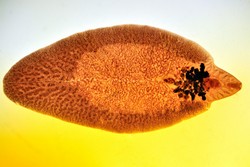Liver fluke products tackle transplant rejection
Transplantation of organs or tissues represents a significant medical challenge. Patients usually undertake chronic immunosuppressive regimes to avoid rejection, but these are associated with general immune deficiency that increases susceptibility to infectious disease and cancer. Understanding the mechanism of immune-mediated transplant rejection is paramount to designing specific interventions against alloresponses. Central to the immune response to allogeneic cells or tissues is the stimulation of T cells by dendritic cells (DCs) towards a pathogenic effector phenotype. Strategies that target the interface between innate and adaptive immunity alter the nature of the response towards a more regulatory phenotype. Pathogenic microorganisms have evolved specialised mechanisms to evade immune responses and survive within hosts. Studying these mechanisms or identifying the implicated molecules could open new avenues in human transplantation procedures. With this in mind, the EU-funded TOLEROGENIC PAMPS (Pathogen derived immunomodulatory components as potential mediators of transplant tolerance) project focused on the identification of immunomodulatory components of the helminth parasite, Fasciola hepatica also known as the liver fluke. The rationale was to investigate if any of the excretory secretory (ES) products could be used to modulate the immune responses following transplantation. ES components were tested for their capacity to modulate both innate and adaptive immune responses in vitro. Researchers found that a lead compound induces the expression of the immunosuppressive cytokine TGF-b from DC. It also exhibited profound immunosuppressive effects on both innate DC and adaptive T cell activation responses. The ES compounds were further tested in vivo in an established model of autoimmune disease called experimental autoimmune encephalomyelitis. The promising ES-derived components with significant in vivo immunomodulation capacity were analysed by mass spectrometry to reveal 13 novel peptides. Since operational tolerance without the need for continuous immunosuppression remains elusive, the deliverables of the study represent a significant step forward. Considering the lower prevalence of autoimmune disorders and allergy in countries with endemic helminth infections, the TOLEROGENIC PAMPS approach has great chances to work in the clinic. The researcher established a competitive independent research group in translational immunology and attained a tenured faculty position at the host institution. The reintegration and career development objectives planned for the reintegration period are therefore considered to have been achieved.







